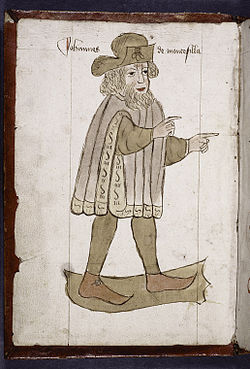
portrait of Sir John Mandeville, from 1459
[One of the most widely read Holy Land travel narratives of the 14th century was attributed to a certain Sir John Mandeville. Some scholars believed it was compiled from writings of It appears to have been compiled from the writings of William of Boldensele, Oderic of Pordenone, and Vincent de Beauvais. Whoever the author, it is a fascinating read for the positive depiction of Islam. The entire book is online, but here is the part on Islam.]
NOW, because that I have spoken of Saracens and of their country — now, if ye will know a part of their law and of their belief, I shall tell you after that their book that is clept ALKARON telleth. And some men clepe that book MESHAF. And some men clepe it HARME, after the diverse languages of the country. The which book Mohammet took them. In the which book, among other things, is written, as I have often-time seen and read, that the good shall go to paradise, and the evil to hell; and that believe all Saracens. And if a man ask them what paradise they mean, they say, to paradise that is a place of delights where men shall find all manner of fruits in all seasons, and rivers running of milk and honey, and of wine and of sweet water; and that they shall have fair houses and noble, every man after his desert, made of precious stones and of gold and of silver; and that every man shall have four score wives all maidens, and he shall have ado every day with them, and yet he shall find them always maidens.
Also they believe and speak gladly of the Virgin Mary and of the Incarnation. And they say that Mary was taught of the angel; and that Gabriel said to her, that she was for-chosen from the beginning of the world and that he shewed to her the Incarnation of Jesu Christ and that she conceived and bare child maiden; and that witnesseth their book.
And they say also, that Jesu Christ spake as soon as he was born; and that he was an holy prophet and a true in word and deed, and meek and piteous and rightful and without any vice.
And they say also, that when the angel shewed the Incarnation of Christ unto Mary, she was young and had great dread. For there was then an enchanter in the country that dealt with witchcraft, that men clept Taknia, that by his enchantments could make him in likeness of an angel, and went often-times and lay with maidens. And therefore Mary dreaded lest it had been Taknia, that came for to deceive the maidens. And therefore she conjured the angel, that he should tell her if it were he or no. And the angel answered and said that she should have no dread of him, for he was very messenger of Jesu Christ. Also their book saith, that when that she had childed under a palm tree she had great shame, that she had a child; and she greet and said that she would that she had been dead. And anon the child spake to her and comforted her, and said, “Mother, ne dismay thee nought, for God hath hid in thee his privities for the salvation of the world.†And in other many places saith their ALKARON, that Jesu Christ spake as soon as he was born. And that book saith also that Jesu was sent from God Almighty for to be mirror and example and token to all men.
And the ALKARON saith also of the day of doom how God shall come to doom all manner of folk. And the good he shall draw on his side and put them into bliss, and the wicked he shall condemn to the pains of hell. And among all prophets Jesu was the most excellent and the most worthy next God, and that he made the gospels in the which is good doctrine and healthful, full of clarity and soothfastness and true preaching to them that believe in God. And that he was a very prophet and more than a prophet, and lived without sin, and gave sight to the blind, and healed the lepers, and raised dead men, and styed to heaven.
And when they may hold the Book of the Gospels of our Lord written and namely MISSUS EST ANGELUS GABRIEL, that gospel they say, those that be lettered, often-times in their orisons, and they kiss it and worship it with great devotion.
They fast an whole month in the year and eat nought but by night. And they keep them from their wives all that month. But the sick men be not constrained to that fast.
to be continued